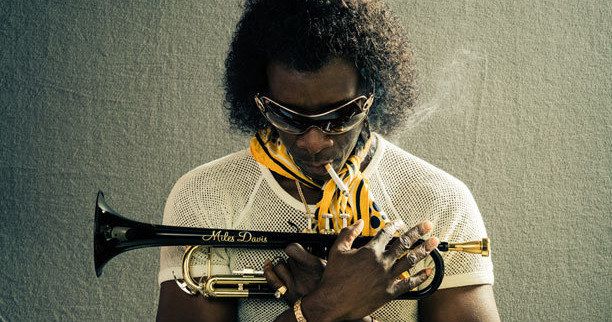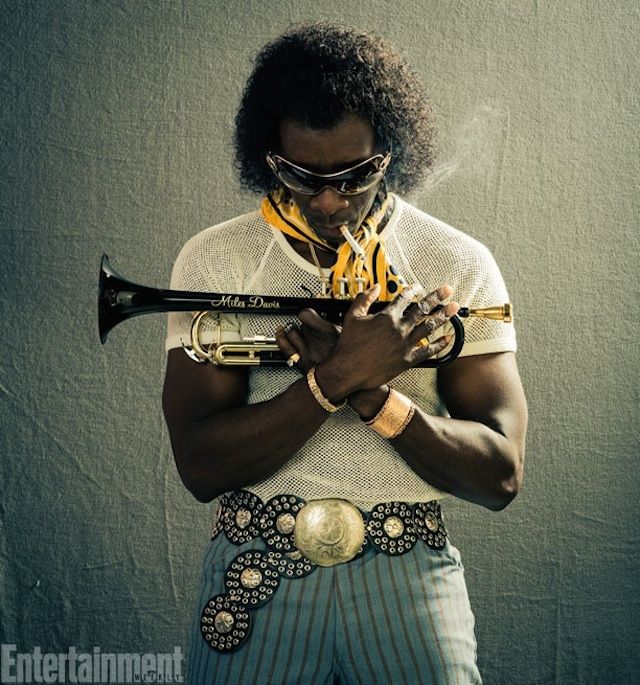Don Cheadle is getting ready to make his directorial debut with the Miles Davis biopic Miles Ahead, which is slated to begin production this week in Cincinatti. The first photo has been released featuring the actor in full costume as the jazz legend, along with an extensive interview where Don Cheadle discusses the long road to get this project off the ground, why he turned to crowd-funding with IndieGogo, his longtime obsession with the music of Miles Davis, and much more. Take a look at the image, then read on for more details.
When asked about the image itself, Don Cheadle attributed most of the credit to his hair, makeup, wardrobe and props department.
"It's a great shot. It's kinda cool, huh? I attribute that to my department to more than anything I'm doing: That's hair, makeup, wardrobe, and props. But it's cool to be sitting on it and have it all begin. At this point, with everything that's happening, its real and surreal and hyperreal and every version of it that I can think of."
The musician was an early influence on Don Cheadle, from listening to the iconic Porgy and Bess album as a child to seeing him perform at Red Rocks in Colorado. When asked what it was about his life story that inspired him to make this film, which he stars in, co-writes and directs, the actor-filmmaker had this to say.
"Well, the thing about Miles Davis was that he thought of himself as a social musician who played social music and didn't want to be boxed in and defined. He could recognize talent that very few could and not only recognized it, but gave the people with whom he played room to develop and grow and stretch out and find their own voices. That's why he spawned so many leaders. Everyone who played with Miles' band became a leader and most of them went on to be leaders of bands and have long recording careers because he gave them the room to create and demanded that they create. He's the guy, if he heard you rehearsing your solo and then you played that onstage, you were fired. I don't pay you to rehearse, I don't pay you to rehearse, I pay you to rehearse live in front of people. Don't bring your polished solo out, go out and go crazy."
He also talked about the project's long road in development, including how Miles Davis' nephew mentioned he was playing the singer in a 2008 interview, which took him by surprise.
"This was something that had been a periphery for me. I never thought about portraying him, really. I had done several other quote-unquote biopics and was always struck by the limitations they presented, because they were trying to be historically accurate. Let's be honest, any biopic is a series of omissions and conflations of events and amalgamations of characters. And you're trying to have a movie experience under three hours, so in the process you condense people's lives from cradle to grave, so things tend to feel episodic and event-oriented as opposed to a story about people and relationships and a character. So I didn't want to do another biopic. So when I heard the idea, from various people who had played with him, producers, writers, that this could potentially be something, I thought, 'if the script is great, I would be open to it since he's always been a fascinating figure to me.' And then, in 2008, when Miles was inducted into the Rock and Roll Hall of Fame, his nephew was interviewed and was asked, 'Would you ever do a movie on his life?" He said yes, and that Don Cheadle is going to play him. And I was like 'I am?' I haven't seen it. I haven't seen the script, I haven't gotten a call. Then producers had been talking to the estate about the project got in touch with me and I sat down with them and they began pitching me the idea. And again, they were standard biopics, fare that was concerned with hitting benchmarks. Miles' life could be a 10-part miniseries on PBS-it can't be done in five minutes. I don't know how you do that about someone who was relevant in music for 50 years and give it any sort of importance. It needs to be more of a movie that he would want to star in. Miles Davis was the star of his own story."
While Don Cheadle says he wouldn't exactly call Miles Ahead a true "biopic," there are certainly elements of that type of storytelling in the movie, but he's interested in expanding that genre as well.
"You can (call it a biopic) if you want, and there are elements of it that would make it that. But to me, that was something I was rejecting. I wasn't interested in that, and I'm not interested by all the things that a traditional biopic does. I want to tell a hot story that's full of his music that feels impressionistic in that it finds a way to incorporate all his musical styles and influences and ideas. It needs to feel like his approach: "I don't care about what happened before. I'm about what's happening now and about what's happening next." That's Miles' marching orders to me. So I left the meeting, and told them if a picture is ever developed and feels like that, then I'd be interested in playing it. By the time I got home, the producer had called me, and I was about to call him. And I said 'I have to do this.' As the filmmaker-whatever that meant, as the writer, director and actor, to bring this concept into being. And so much has happened with the process-I was working with a writer and ended that relationship. We had a home on HBO and then we weren't anymore. And finally, Steven Baigelman, who co-wrote the movie with me, came on, and we decided we'd do something crazy, and just go for it. [Laughs] With the blessing and support of the family, and people like Herbie Hancock and others that have known and played with Miles and knew what he was about, we decided to go ahead and make a movie that Miles Davis would have wanted to be in."
The actor/filmmaker also said that the story will take place in 1979, during a "quiet period" for the musician.
"Well, the construction of the movie is the parallel story of Miles in 1979 at the end of this quiet period he was in, the five-year stretch of time when he wasn't playing and performing and recording, juxtaposed against the 10-year period where he was with Francis Taylor Davis, who, at the time, was the love of his life and his muse."
He also added that the project has the full support of Miles Davis' family, and that they have the rights to all of his music, and that Herbie Hancock is involved with the soundtrack.
"You know, hopefully it will be not just a release of his music. Herbie Hancock is kind of godfathering the whole thing and we're running all of this by him. This soundtrack hopefully could be more than just a soundtrack of music from the movie; it can be music that's been inspired by the pieces we select. It's about trying to bring it forward and not just chronicle what has passed before."
While the actor will be playing the trumpet in the movie, but he insisted that Miles Davis' original music will be used more than his trumpet playing.
"I'm not going to be, we're going to be using Miles Davis playing. [Laughs] We're not going to do a movie with the rights to his music and not have him playing. We're going to use his recordings. I've learned how to play. There will be elements of me playing the movie but when it comes to the pieces that are Miles Davis playing, it will be Miles Davis."
He also talked about using the crowd-funding platform IndieGogo to help secure all of the financing they needed to get production started.
"This is an independently produced film. There is no studio element. We're still in the process locking down all the financing so it was a component of funds needed to cover a gap , including my own personal money I've put into the movie and a consortium of others. It's to cover what it takes to put together a period movie, that has to have different looks and ways you're trying to authenticate the time period you're dealing with. And the music rights-all of that stuff costs money. But it also felt like a good way to open him up back to the public and try to raise that awareness and use the social mediums to make this a social event. To make it social, like the music Miles talked about. It just made sense on multiple levels to do it this way."


